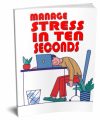Table of Contents
Chapter 01 – What is Stress and How Does it Damage You?
So What Exactly is Stress?
How Stress Damages the Brain?
Chapter 02 – The Complexity of Your Stress Systems
How Physiological Changes Trigger Stress?
Chapter 03 – Ways to Manage Normal Stress
Chapter 04 – How Does Meditation Reduce Stress?
How to Get Started With Meditation?
Tips
Correct Breathing for Stress Reduction
Chapter 05 – Mindfulness and CBT
Cognitive Restructuring
Conclusion
Sample Content Preview
In the short term, this is good for us. In the short term, these things help us to evade danger and win combative situations. Increased muscle tension makes us stronger. Increased blood viscosity makes our blood more likely to clot in case of an injury. Dilated pupils let more light in to improve our vision. Suppression of secondary functions means that more blood can be sent to the muscles and the brain. Reduced pain means we can carry on fighting or running despite injury.
In short, anything that can help you to survive is prioritized, while secondary functions are suppressed. The idea is that once we get to safety, we can then turn off this fight or flight response and instead enter the ‘rest and digest’ state in order to recover. Once the predator is gone, we can recover.
But the problem is that in our modern environments, predators aren’t the main problem. It’s rare these days for us to be chased, to get into a fight or to need to escape a forest fire.
What’s not so rare, is for our boss to shout at us and to tell us that we’re late for our deadline. It’s not rare for us to be in debt. It’s not rare for us to have marital problems.
And unfortunately, the brain interprets all these signals in just the same way: as threats. And this causes the same fight or flight response. But because these types of threats aren’t so easily resolved, this means we’ll often end up on heightened alert for a longer period of time.
This is also why stress causes impotence in men. If you are highly stressed, blood is sent everywhere except the genitals!
And this takes a tremendous toll on our bodies.
As you might imagine: it is not good for you when your immune system and digestive system are suppressed for days. It’s also not good for your brain to be flooded with norepinephrine and cortisol. It’s not good for your heartrate to stay elevated, or your blood pressure to stay high.
This is the problem with chronic stress as opposed to acute stress. And it’s the problem with heightened levels of stress, as opposed to the gentle, motivating force of ‘eustress’. We’ll look at all of this more in the long term, but suffice to say that the longer stress like this continues, the more you start to feel drained, malnourished, fatigued, ill and possibly eventually depressed.
How Stress Damages the Brain
When we are stressed, it effectively makes us less intelligent. This is due to the reduction in pre-frontal activity, which in turn is designed to make us more focussed and alert. Essentially, the pre-frontal cortex is the part of the brain responsible for forward planning, creative thinking and other ‘high-order’ brain activity.
When you are being chased by a lion though, it is really not the time to be thinking about the meaning of life!
So shutting down this part of the brain and placing your focus on feedback from your senses makes much more sense.
Of course that’s not particularly useful in the workplace though: and this is why the stress response is so seriously unhelpful when we have to give a presentation, answer a question on the spot or go on a date. This is when we lose all articulation and start stammering and saying useless things.
Slightly longer-term is adrenal fatigue. This is what happens when your brain has exhausted its supply of adrenaline and other stress hormones. That might sound like a good thing but you actually need a little norepinephrine, dopamine and cortisol to stay motivated – and even to wake up in the morning! Adrenal fatigue leaves you listless, demotivated and potentially depressed. It can also cause what is known as ‘learned helplessness’ – a condition where you essentially completely give up because your brain has been conditioned to learn that any attempts to change its situation will be met with failure. Not good!
Worse, when you are highly stressed, it can lead to long term problems for your brain health. As we briefly mentioned: it can literally shrink your brain! Studies show that in the long term, it leads to structural changes that shrink the hippocampus and shrink grey matter – the all-important neural connections throughout the brain. Even a single, severe traumatic event can result in significant reductions in the medial PFC, anterior cingulate and subgenual regions of the brain. The effects of ‘cumulative adversity’ meanwhile, cause smaller volumes in the medial prefrontal cortex (the PFC), insular cortex and anterior cingulate regions.
These regions of the brain correspond with emotional control, decision-making, reasoning and self control.
In other words, the eventual result of stress is to leave you more reactionary, more depressive, more impulsive and less disciplined.
From here, every aspect of your life will start to see negative effects. But there are things you can do about it…
Chapter 02 – The Complexity of Your Stress Systems
But what if you’re not stressed?
What if your work isn’t particularly high pressured, your relationships are good and you have plenty of money? Does that mean you’re fine?
Probably not. Unfortunately, many other aspects of our modern lifestyles cause symptoms similar to those of stress.
One example is our use of technology and artificial lighting. The brain is designed to use external cues (‘zeitgebers’ to use correct terminology) to set its own biological rhythms including the sleep-wake cycle (circadian rhythm).
This actually triggers the release of stress hormones at certain times of day. That’s because stress hormones are one of the tools that the body uses to wake itself up when you are sleeping. The release of stress hormones like cortisol and norepinephrine triggers activity in the brain that stirs you out of sleep and makes you fully alert.
But if the light is on at night, or you’re looking at your phone in the evening, this will cause the release of similar stress hormones right when you’re meant to be relaxing. That means you’ll continue to feel alert and won’t give your brain time to recover.
And what doesn’t help is the way that everything on the web and on TV is designed to grab our attention and pull us this way and that – this has been shown to cause effects similar to ADHD in the long term and make it harder for us to concentrate on any one thing for very long.
Other Details- 1 Ebook (PDF, DOC), 32 Pages
- 4 Ecovers (PSD, JPG, PNG)
- Year Released/Circulated: 2020
- File Size: 52,295 KB
License Details:
[YES] Can be sold
[YES] Can be used for personal use
[YES] Can be packaged with other products
[YES] Can modify/change the sales letter
[YES] Can modify/change the main product
[YES] Can modify/change the graphics and ecover
[YES] Can be added into paid membership websites
[YES] Can put your name on the sales letter
[YES] Can be offered as a bonus
[YES] Can be used to build a list
[YES] Can print/publish offline
[YES] Can convey and sell Personal Use Rights
[YES] Can convey and sell Resale Rights
[YES] Can convey and sell Master Resale Rights
[YES] Can convey and sell Private Label Rights
[NO] Can be given away for free
[NO] Can be added to free membership websites













